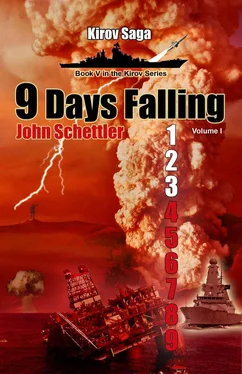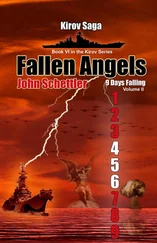As for local threats, all he had at the moment was the Rig Boss and his side arm. He squinted through his binoculars, not liking the sight of those damnable fast lighters the rebels had out near the coastline. Where was KAZPOL? What the fuck were they doing? Probably running all over the region trying to tamp down one little incident after another. The pink dawn was starting to silhouette some of the inshore facilities. There was an unwelcome plume of smoke riding up on the hazy morning air.
He stared at the FAX he had received from San Ramon. They were already papering over the news with an official statement being readied for the press. “We are working with all appropriate government agencies and community leaders to try and restore peace and stability in the area and will resume normal business… etc., etc.”
Fat chance of this getting air time in any case, not with the aftermath coverage for hurricane Victor at Houston this morning. Chevron had weathered far worse storms than this one but press had not been rosy in recent months. That was the least of his worries. What was he going to do about the Galveston , and what were those damn swift boats up to yonder?
His mind invariably went to Timmermann and his merc detachment. Where the hell were they? He’d put in the emergency call five hours ago. Company helo has been out for hours, but no mercs. How was he supposed to fend off the locals with the Rig Boss and his sidearm? How was he supposed to find the Galveston , let alone her crew? And what was this new shit about tanker traffic being routed into the Black Sea? That place could become a lake of fire any day. Did they think he was about to start moving significant amounts of crude under these conditions? He’d need security, damn it, and lots of it. Then he’d be lucky if he had any line pressure left to even get flow started on the pipeline to Baku.
Second quarter output for Chevron had slipped to the lowest level since 2018. Q3 was equally depressed. Flack had news for the Bollinger Boyz—it wasn’t going to get any better, and Chevron was not the only company hurting right now. It was going to get worse, and it was going to get mean, particularly if the Russians sent that Motor Rifle Division across the border up north.
“Mudman!” Flack yelled so he would be heard over the constant music flow into his technician’s head.
“What’s up, Flackie?”
“That shit out east looks bad. I think we may be getting some uninvited visitors soon. Where’s the damn helo?”
“HellifIknow,” Mudman ran the words together as he chewed on another granola bar. “Nuthin’ on radio for hours.” He was distracted by the small TV set where he was watching the local news feed out of Fort Shevchenko.
“Well we’re missing a goddamned tug!” Flack ran a hand through his thinning hair. The sweat on his brow a fine sheen.
Mudman looked at him, his jaw slack. He was pointing at his TV monitor, waving Flack over. “Think I found it,” he said with a solemn tone.
Flack was at his side, his eyes rolling with disgust the instant he saw the image on the screen. It was the Galveston , surrounded by lighters full of gunmen, and her blindfolded crew all lined up on the foredeck.
“What a load of crap,” Flack swore.
“Shot her up pretty bad,” said Mudman. There was obvious damage to all the wind screens and siding on the tug. Someone just let loose with a Kalashnikov in the air, and the scene became a jubilant little hostage fest. “And look, isn’t that a Caverton Helo?” The Caverton Offshore Support Group had a small fleet of helos providing shore to sea lift services to any number of commercial interests in the region.
Flack squinted at the screen. “Yeah, that’s Caverton, alright.”
“Well, shit!” Mudman pointed at the screen. “Looks like they’ve got a full scale evacuation going on.” The scene shifted in a jerky motion. The camera man was running. There was an explosion and the Caverton helo careened onto the tarmac, its main rotor spinning wildly out of control, the craft engulfed in flame.
“Christ almighty…” Mudman just stared. “…everything living and unliving…And every other unthinkable vice…” He repeated the threat he had made light of earlier in the rebel press release, suddenly realizing they just may mean what they said this time.
“Gonna need Timmermann,” said Flack. “Where’s the damn mercs? Where’s KAZPOL?” He had a real case of the blues this morning, and the long day had just begun.
~ ~ ~
Flackwasn’t the only man thinking about the oil in the Caspian Sea. That same day Alberto Salase spent a good long time on the phone speaking to the same “pencil pushers” at Bollinger Canyon that Flack always complained about. That evening he boarded a helicopter for a very special trip out to Larnaca Bay. Salase was a business broker out of Alexandria, with a well developed local network in the region. Now he was fortunate to be welcomed aboard the Argos Fire, the floating corporate headquarters of Fairchild & Company, for a privileged visit with a potential new client.
And a privilege it was, thought Captain Gordon MacRae as he ushered the portly black man into the dining room. Elena Fairchild was not one to allow such a face to face meeting, at least so early into a business relationship. The normal protocols would have seen Salase jumping one middle manager after another, and then proving himself before being admitted to the inner circle of the Fairchild executive offices.
But the rapidly evolving oil situation was shaking up all the old protocols. The rising global tensions had swept away longstanding plans by any number of major producers courting operations in Central Asia. The Russians had shown them just how easy it was to put their thumb on the jugular, cutting the pipelines they had vainly tried to build to outflank Russian soil, and Russian interests in the region. And when the oil didn’t flow, the money stopped flowing as well.
Fairchild was a realist at heart, he knew. The company had relied on Persian Gulf contracts for the last several years, but now she wanted out. Eliminating the Suez bottleneck or a long trip around the Cape of Good Hope offered considerable savings in both operational costs and peace of mind. Now she was keen to leave the dangers of the Gulf behind make new inroads in the turbulent Central Asian superfields. The terminal Port of Ceyhan was an east port of call in well protected waters, and the transit from there to ports in Europe or the US were much more secure—until the BTC line blew up.
A boson’s mate smartly piped the Captain’s entry to the dining hall and announced Alberto Salase as the guest of honor. Elena Fairchild was already seated at the executive table, and she rose to greet the two men as they approached, dressed smartly in a form fitting pants suit, pale grays, with a plain white blouse flaring open at the neck, accessorized by a burgundy scarf. Her dress was smart, yet more functional than anything else, the clothing loose fitting so she could breath in the humid Mediterranean climate.
She was a middle aged woman in her late forties, though her tall, athletic figure had held on very nicely through the years, and she still had a youthful aspect, in spite of a fleck of gray that she bravely allowed in her dark hair, when most women would have rinsed it away years ago. She could have been a marathon runner if she had had a mind for the sport—certainly had the legs for it, though her pants suit gave her a prim and almost androgynous appearance. And she was not one for the ornaments of jewelry, allowing herself a pair of white pearl earrings and a silver Claddagh ring on one hand.
The simplicity of the ring suited her well—the circular bands ending with two hands clasping a heart, and a crown above. It was not a wedding band, in the traditional sense, for she had never married, though it could be used to signal a person’s romantic availability, or lack thereof, depending on which hand it was sported, and on which direction the hands and heart were faced.
Читать дальше












